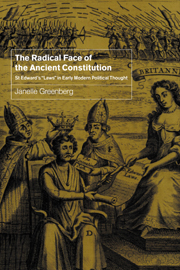Book contents
- Frontmatter
- Contents
- Acknowledgments
- 1 Hagiography and historiography: the long shadow of Edward the Confessor
- 2 “Those most noble and equitable laws of St. Edward”: from the cult of the Confessor to the cult of the Confessor's laws
- 3 “Divers and sundry ancient histories and chronicles”: the articulation of the ancient constitution in the Tudor period
- 4 “By lex terrae is meant the laws of St. Edward the Confessor”: the footprints of the Saxons in the early seventeenth century
- 5 “You shall be king while you rule well”: the radical ancient constitution in the civil wars and interregnum
- 6 “That noble transcript of the original contract, the Confessor's laws”: the radical ancient constitution in the late Stuart period
- Bibliography
- Index
2 - “Those most noble and equitable laws of St. Edward”: from the cult of the Confessor to the cult of the Confessor's laws
Published online by Cambridge University Press: 29 August 2009
- Frontmatter
- Contents
- Acknowledgments
- 1 Hagiography and historiography: the long shadow of Edward the Confessor
- 2 “Those most noble and equitable laws of St. Edward”: from the cult of the Confessor to the cult of the Confessor's laws
- 3 “Divers and sundry ancient histories and chronicles”: the articulation of the ancient constitution in the Tudor period
- 4 “By lex terrae is meant the laws of St. Edward the Confessor”: the footprints of the Saxons in the early seventeenth century
- 5 “You shall be king while you rule well”: the radical ancient constitution in the civil wars and interregnum
- 6 “That noble transcript of the original contract, the Confessor's laws”: the radical ancient constitution in the late Stuart period
- Bibliography
- Index
Summary
Every tradition grows ever more venerable – the more remote is its origin, the more confused that origin is. The reverence due it increases from generation to generation. The tradition finally becomes holy and inspires awe.
Friedrich NietzscheST. EDWARD AND THE SAGRALIZATION OF ENGLISH KINGSHIP
As the preceding chapter noted, St. Edward's laws deserve pride of place among the trinity of texts that formed the foundation of the ancient constitution. And St. Edward himself constituted the actual, non-legendary ancestor upon whom the ancestral constitution was based. This is a fact of some importance, since an historical construction founded on a mythical figure such as Brut might well have been extinct by the mid-seventeenth century, a casualty of the increasingly sophisticated scholarship associated with Sir Henry Spelman, John Selden, and Sir William Dugdale. As it was, the ancient constitution, with the exalted Confessor at its center, boasted a long and respectable medieval pedigree, nourished and sustained by generations of esteemed sources and writers. This chapter explores the early origins and literature of the ancient constitution and examines the beginnings of the process by which a cult of kingship was transformed into a cult of law.
The story commences in the early middle ages, when both Saxons and Normans discovered that linking themselves to the English past carried distinct political and legal advantages.
- Type
- Chapter
- Information
- The Radical Face of the Ancient ConstitutionSt Edward's 'Laws' in Early Modern Political Thought, pp. 36 - 78Publisher: Cambridge University PressPrint publication year: 2001



